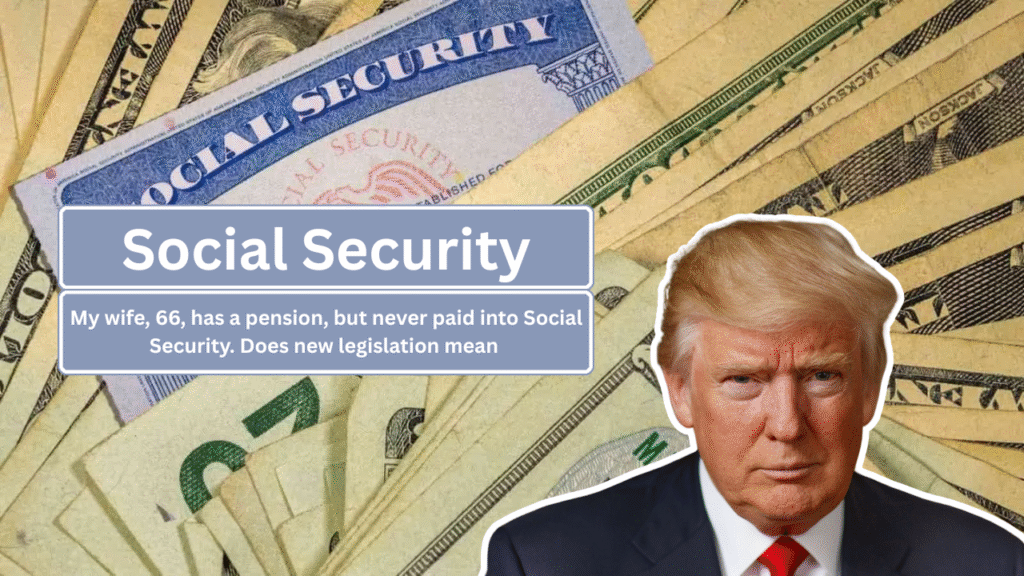Recent changes in federal legislation have sparked new hope for retirees who were previously excluded from receiving Social Security benefits due to their employment history. A common question arises in households across the U.S.: If my wife, age 66, has a pension but never paid into Social Security, will she now qualify for benefits?
The answer largely depends on the impact of the Social Security Fairness Act of 2025, which eliminates two provisions that had historically reduced or denied Social Security benefits to certain public-sector retirees. While this law offers new possibilities, it does not automatically guarantee benefits to all who previously didn’t qualify.
Background: Pension Without Social Security Contributions
Many Americans, particularly those who worked in state or local government jobs like teaching, law enforcement, or firefighting, receive pensions from jobs where they did not contribute to Social Security. As a result, they were not eligible for retirement benefits through the Social Security system based on their own work history. In many cases, these individuals were also denied spousal or survivor benefits through their spouse’s earnings.
The Social Security Fairness Act of 2025

Signed into law in January 2025, the Social Security Fairness Act repeals two controversial provisions: the Windfall Elimination Provision (WEP) and the Government Pension Offset (GPO).
- WEP: This provision previously reduced Social Security retirement or disability benefits for individuals who had a pension from work not covered by Social Security.
- GPO: This offset reduced or eliminated spousal and survivor benefits for those receiving a government pension.
With both provisions now repealed, retirees and their families may be newly eligible for benefits—or may receive higher benefit amounts than before.
How the Repeal of GPO Affects Spousal Benefits
In your wife’s case, she never paid into Social Security because her job didn’t require contributions. However, you did contribute, and you are either receiving or will soon receive benefits. The key question is whether your wife can now receive benefits as a spouse.
Prior to 2025, the Government Pension Offset would have significantly reduced or completely eliminated any spousal benefits your wife might have received based on your record. That offset could reduce her benefits by two-thirds of her pension amount. Now, with the GPO repealed, that reduction no longer applies.
This means your wife may now be eligible to receive up to 50% of your full retirement benefit as a spousal benefit—even though she never paid into the system herself.
Eligibility Criteria for Spousal Benefits
To qualify for spousal benefits under Social Security, the following conditions must be met:
- You must be receiving Social Security retirement or disability benefits.
- Your wife must be at least 62 years old (or any age if caring for a child under 16 or with a disability).
- You must have been married for at least one continuous year.
- She must apply for the benefit and meet income and legal residency requirements.
Keep in mind that if your wife applies for benefits before her full retirement age (which is 66 or 67, depending on her birth year), the benefit amount will be reduced.
Survivor Benefits and the New Law
If you pass away, your wife could also be eligible for survivor benefits. These are typically equal to 100% of your benefit amount, provided she is at full retirement age when she begins receiving them. The repeal of the GPO makes these benefits much more accessible to widows and widowers with pensions.
Does the New Law Mean Automatic Eligibility?
While the repeal of the WEP and GPO increases access to Social Security benefits, it does not mean that individuals like your wife will automatically start receiving checks. She will need to apply and go through a standard review process with the Social Security Administration (SSA), which includes verifying your work record, her pension income, and marital status.
What You Should Do Next
- Contact the SSA: You or your wife should call the Social Security Administration at 1-800-772-1213 or visit a local SSA office. You can also begin the process online at www.ssa.gov.
- Review Your Earnings Record: Make sure your earnings history is correct, as your wife’s spousal benefits are based on your full retirement benefit.
- Apply for Spousal Benefits: Once she is eligible and ready, she can file for spousal benefits. It’s best to apply three months before she wants benefits to begin.
- Consult a Financial Advisor: A professional can help evaluate the timing of filing and its impact on your household income and taxes.
Conclusion
Thanks to the Social Security Fairness Act of 2025, your wife’s eligibility for benefits has significantly improved. While she will not receive benefits based on her own work record, she may now qualify for unreduced spousal benefits based on your Social Security contributions.
To confirm eligibility and maximize potential benefits, contact the Social Security Administration and speak with a financial advisor. After years of being locked out due to outdated provisions, many retirees like your wife finally have a path to receive what they were previously denied.




